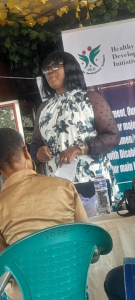Understanding and moving away from environmental hazards, have been described as the keys to healthy living. A health expert, Mrs. Ordu E. Ada made the assertion at a one-day stakeholders roundtable organised at Igwuruta, in Ikwerre Local Government Area of Rivers State for community persons from oil impacted Umuechem and Abara.
The representative of the Rivers State Health Management Board who delivered a presentation on health implications of environmental pollution, said environmental hazards negatively impacts people especially, women chemically, physically, biologically and psychological, causing serious harm to the health of victims.
Ada listed the impact of environmental hazards to include mental ill-health, stress, respiratory, kidney, and reproductive diseases, poor feeding from poor yield, and domestic violence, among others.
She noted, “The body systems work together; if any system collapses, every system collapses,” and advised, “try to avoid anything in the environment that will affect the system.”
In order to live healthy, she suggested some preventive measures such as, “safe household storage and hygiene methods to prevent water pollution, ensuring that cups are clean and reserved to prevent spread of diseases, hand washing for all, including babies, ensuring there are non-stagnant waters, better built living space to avoid crowding and maintaining a clean environment.
She also advocated for the provision of safe and adequate supply of water to communities, sensitisation on safe/clean environment and practice of self-control.
Early detection of health challenges she added, would be made possible, “by being aware of your physical environment to know when there is obvious hazard and identifying immediate changes in your person”.
A major step to stem stress, she also said, is to plan against unwanted pregnancy to save the life of the woman.

Another resource person, Mrs. Rita Kigbara lamented that the rich ecosystem of the Niger Delta has been destroyed by extractive activities, thereby destroying the livelihoods of the people and adding to the burden on women.
“The Niger Delta is one of the 10 most significant wetlands in the world and much of the living and non-living elements have been destroyed. Women face more risks from oil and gas pollution and climate change as they face displacement, poverty.”
According to her, as the main burden bearers, women should be in the frontline of those seeking solutions to the environment problem.
“There is need for the engagement of stakeholders to bring in women in brainstorming on adaptation methods to address climate change and environmental issues.
“Women need to be part of the discussion and decision making on pollution control to create a better understanding of the impact of pollution and networking opportunities,” she stressed.
Rita condemned the lack of access to land among women and their exclusion from decision making as she called for the inclusion of women with capability for effective representation so that the voices, needs of women will be heard.
Community women from Umuechem and Abara in their contributions, lamented that prolonged oil spills have not only destroyed their farming occupation and made them poor, but has critically harmed their health.
The women listed health hazards they are forced to live with as including deafness, dumbness, depression, eye problems, with people in their communities going blind early; stomach ulcers, infertility, excessive heat and skin diseases, respiratory/kidney diseases and arthritis as well as high blood pressure.
Speaking on behalf of persons with disability (PWDs), Miss. Assumpta Ebiukwu lamented that her group is often neglected. “We need inclusion in programmes and activities. There is no accessibility for PWDs in most of the health centres.”
The zonal director of the National Oil Spill Detection and Response Agency, NOSDRA, Mr. Ime Ekanem represented by Mr. Solomon Ukpenevi, stated that while old oil operators still flare gas, new operators are by the new law, compelled to operate without flaring gas.
He disclosed that with the development of gas trackers, a collaboration between NOSDRA, stakeholder Democracy Network and some other concerned civil society organizations, the level of gas still being flared has reduced significantly.
“Some oil fields now have zero flare although old installations are still flaring. Progress is being made. The law forbids new installations from flaring gas without considering the environmental impact assessment. Gas flare conversion companies are coming up,” he informed.
The male community leaders at the roundtable blamed the federal government and the oil companies operating in their areas for the state of the oil host communities.
“Blame the Federal Government and oil companies for fraud and theft. Care of communities will reduce the rate of vices in the communities. Take care of health, provide amenities,” they demanded.
coordinator of Healthy Life Development Initiative, HELDI, Dr. Mfon Utin, organizers of the roundtable, said the negative socio-cultural impact of oil has never been remediated and that the vulnerable groups, women and PWDs, who are most impacted, are not put into consideration when issues are being addressed.
According to her, the project seeks to address that omission with the aim of amplifying the voices of the vulnerable so that sustainable solutions can be put in place.